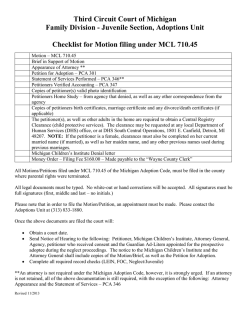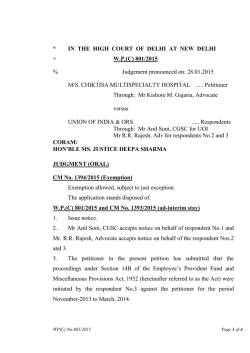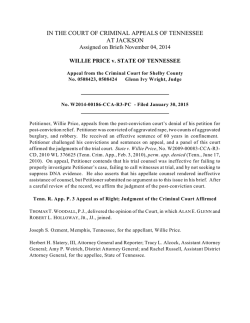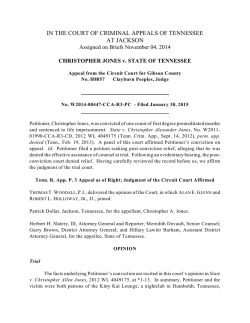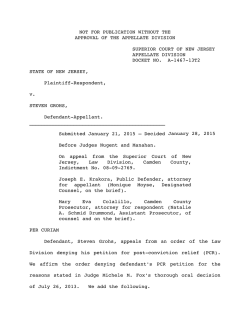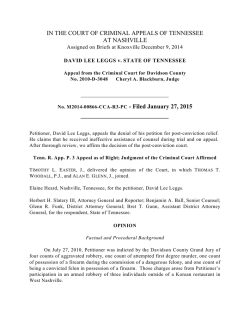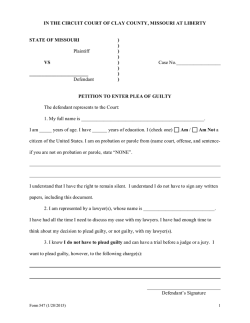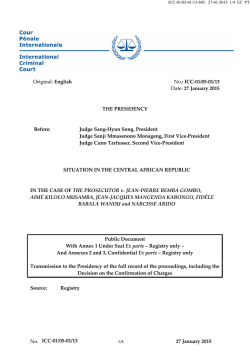
Markhayle Jackson v. State of Tennessee
IN THE COURT OF CRIMINAL APPEALS OF TENNESSEE AT JACKSON Assigned on Briefs August 05, 2014 MARKHAYLE JACKSON v. STATE OF TENNESSEE Appeal from the Criminal Court for Shelby County No. 1101634 Lee V. Coffee, Judge No. W2013-02027-CCA-R3-PC - Filed January 30, 2015 Petitioner, Markhayle Jackson, entered a best interest plea to first degree premeditated murder and received a sentence of life imprisonment without the possibility of parole. Petitioner now appeals the trial court’s denial of his petition for post-conviction relief, in which he alleged that his guilty plea was not knowingly, voluntarily, and intelligently entered. Having reviewed the record before us, we affirm the judgment of trial court. Tenn. R. App. P. 3 Appeal as of Right; Judgment of the Criminal Court Affirmed T HOMAS T. W OODALL, P.J., delivered the opinion of the Court, in which A LAN E. G LENN and R OGER A. P AGE, JJ., joined. Lance R. Chism, Memphis, Tennessee, for the appellant, Markhayle Jackson. Herbert H. Slatery, III, Attorney General and Reporter; Sophia S. Lee, Senior Counsel; Amy P. Weirich, District Attorney General; and Ray Lepone, Jennifer Nichols, and Sam Winnig, Assistant District Attorneys General, for the appellee, State of Tennessee. OPINION Background Guilty Plea Submission Hearing The facts of Petitioner’s case as recited by the State at the guilty plea submission hearing are as follows: [O]n December 14th , 2009, at approximately 3:30 p.m., Kelvin Cooper was at 3477 Parkwin, Apartment 104, here in Memphis, Shelby County, Tennessee. He had been set on fire. He was alive when the police got there. There were several residents in this apartment complex that saw him get out of a trunk of a car that was on fire. When he got out of the vehicle, he was on fire. They attempted to put him out. He did succumb to those injuries. He died of thermal injuries on December 15 th , 2009. The Memphis Police Department investigation revealed that there were three suspects involved in this brutal homicide. [Defendant], Dewoyne Gw[y]nn and Chronda Walker. The investigation revealed that Miss Walker had a prior relationship with this victim. Lured him over to an apartment complex in Bridgeway Apartments. At that point, [Defendant] and Dewoyne Gw[y]nn abducted him and kidnapped him, held him at gunpoint, beat him, made him strip down to nothing. Took his money and his cell phone. They marched him out to his own vehicle and put him in the back or put him in the trunk of his own vehicle, at which time [Dewoyne] Gw[y]nn got into the driver’s seat, [Defendant] got into the passenger seat. Before they left that location, the proof would have shown, Your Honor, that [Defendant] went to a gas station around the corner. He was seen on video. This is video that we would have produced at the trial. Where he was in the victim’s vehicle and he got out a gas can and filled it up with gas at that gas station and put the gas can back into the vehicle, at which time, when the victim Kelvin Cooper was in the trunk, they drove him around to an apartment complex, got out of the vehicle. -2- Mr. Cooper, according to the defendant’s own statements was begging for his life and [Defendant] assured him that nothing would happen to him. At which time, [Defendant] poured gas all over him. Shut the trunk and poured gas on the car and lit him on fire. Both [Defendant] and Mr. Gw[y]nn fled the scene and went back to the apartment with Miss Walker. At which time, the rifle they had used to hold him at gunpoint, [Dewonye] Gw[y]nn and Miss Walker took to another location in Memphis off of a street called Sarabee and hid the rifle. Post-conviction hearing Petitioner testified that he was arrested shortly after the death of the victim, Kelvin Cooper, in December of 2009. He was initially represented at the preliminary hearing in General Sessions Court by two attorneys. At the hearing, two detectives testified, and the General Sessions Court found that there was probable cause justifying the case to be bound over to the Grand Jury. Petitioner testified that he never made bond and had been incarcerated since the time of his arrest. Petitioner testified that the State sought the death penalty against him, and two different attorneys were appointed to represent him at trial. The two attorneys will be referred to as trial counsel and co-counsel for purposes of this appeal. Petitioner admitted that he met with his attorneys “very frequently,” and they discussed the facts of the case and the strengths and weaknesses of the State’s case. They also discussed strategy. Petitioner testified that his defense was “basically, go in with the exculpatory evidence that was found in my discovery.” Petitioner denied setting the victim on fire and killing him. He was not certain who killed the victim, but he had “an idea.” He believed that it was Chronda Walker’s boyfriend, Dewoyne Gwynn. Petitioner denied confessing to Ms. Walker or Mr. Gwynn that he killed the victim. Petitioner admitted that his attorney filed a number of motions on his behalf, and there was a suppression hearing. He testified that he gave a statement to police after his arrest “supposedly admitt[ing] to the robbery and the beating and the kidnapping.” When asked why he pled guilty to killing the victim Petitioner replied: Well, my defense team, I basically saw that they wasn’t going to just really fight me [sic]. Then when they brought up the Alford plea, you know, they printed out some papers for me to read over it, and I read over it, and, you -3- know, they told me a little more details about it. It sounded good, so I told them I still wanted to go to trial, then got my family involved. Petitioner testified that he did not admit to killing the victim at the guilty plea submission hearing and that the transcript was incorrect in showing that he admitted it to the trial court. Petitioner felt that his attorneys forced him into a plea because they failed to put forth an effort on his defense. He claimed that his attorneys had no work ethic, and it was like “playing Russian Roulette almost.” Petitioner felt that he should have received a more lenient sentence because his co-defendants, Chronda Walker and Dewoyne Gwynn, received sentences of twelve years at thirty percent. Petitioner testified that he felt pressured into pleading guilty because he was threatened with the death penalty if he did not enter the best interest plea. He claimed that his attorneys told him that he would absolutely receive the death penalty if the case went to trial. Petitioner felt that he would “be the youngest person on death row.” Petitioner testified that trial counsel attempted to negotiate a plea agreement of life with the possibility of parole but it was rejected by the State. Petitioner then agreed to a sentence of life without the possibility of parole because of the threat of receiving the death penalty. His family also encouraged him to accept the plea. Petitioner explained that there was a meeting that included his father, stepmother, grandmother, a high school band member, his former pastor, another band member, his mother, and his little sister. Petitioner testified that he felt pressured by his family and his attorneys to plead guilty. He felt that he did not plead guilty of his own free will and that his free will was in it “ten percent (10%).” On cross-examination, Petitioner admitted that there was a lengthy suppression hearing concerning his statement to police, and the motion was denied. In the statement Petitioner went into detail about taking the victim’s car to buy gas which was put into a gas can and then setting the victim on fire. Petitioner admitted that he was seen in a video from a gas station with the victim’s car. He denied that the video showed him filling a gas can and placing it in the front floorboard of the car. Petitioner admitted he was aware that the State planned to present evidence from a burn expert as to how badly the victim suffered when he was set on fire and that he did not immediately die. There would also have been testimony from witnesses that the victim was on fire when he got out of the vehicle and that they could hear voices coming from the flames. The victim’s head was also on fire, and the witnesses attempted to extinguish the fire with water hoses. However, Petitioner felt that even with the evidence against him, he would have received a more lenient sentence if he had gone to trial. -4- Petitioner testified that trial counsel told him that there would be a direct appeal from the Alford plea. He admitted that he entered the guilty plea in order to obtain the benefit of a sentence of life without parole rather than be prosecuted and receive the death penalty. Upon questioning by the post-conviction court, Petitioner denied telling the trial court at the guilty plea submission hearing that he had committed the offenses. Petitioner felt that whoever prepared the transcript of the hearing filled in some things. Trial counsel testified that he was hired by the Public Defender’s Office to handle capital defense cases. He had a “good bit” of experience in capital litigation and was asked to help “fix the system.” At the time of Petitioner’s case, trial counsel had tried multiple death penalty cases. Trial counsel testified that Petitioner’s legal team consisted of himself, co-counsel, two investigators, and two mitigation specialists. His practice was to meet with clients each week, and it was rare to go two weeks without seeing a client. That statement was true of his involvement in Petitioner’s case. Trial counsel also met with Petitioner’s family, including one Sunday for a couple of hours to answer all of their questions. He said that he and co-counsel had “[b]egging sessions” with the prosecutors in Petitioner’s case. Due to the “egregious nature” of the victim’s death, trial counsel believed Petitioner’s case to be a death penalty case, and the proof against Petitioner was overwhelming. Trial counsel attempted to negotiate a plea of “straight life” or life with parole on several occasions, but the State rejected the offer. He was relieved when the State finally agreed to a sentence of life without parole. Trial counsel testified that he had “open file” discovery in Petitioner’s case. He noted that ninety-five percent of the facts in Petitioner’s case were not in dispute. Concerning the video from a gas station, trial counsel testified: The video shows [Defendant] driving out there with what was later discovered to be the victim’s car, at a gas station. If I remember, we also watched - - it was one of those cameras that goes to different parts of the store, and you could clearly see that was [Defendant]. I think he was wearing a white T-shirt, a wife - - what they call wife-beaters. I think that’s the proper term. But I think wearing that. It’s [sic] was very distinctive. He goes in, makes an exchange at the register. I want to say it was five dollars ($5). Went back out to the victim’s car, and you can see he doesn’t go near the gas tank. He’s kind of at the rear pass - - driver’s side of the vehicle, if I remember correctly, bent over. You can see a - - I don’t know if you call it a spout, but whatever comes out of the gas tank, it’s like a plastic gas container. It was a - -5- * * * I was going to call it a doohickey, but a nozzle is probably a better word. - coming out that, and you can see [Defendant] is bent over, appearing to put gas in that can. He then walks around and - - whatever it is he was pouring into or doing there is placed on the floorboard of the front seat. From the video, the five dollars ($5) of gas that was bought, it doesn’t show it being put into the car. Trial counsel testified that Petitioner admitted that it was him in the video. Trial counsel testified that he and Petitioner reviewed Petitioner’s statement to police, and trial counsel also reviewed the statement with Petitioner’s family. He did not feel that Petitioner’s guilty plea was involuntary. He noted that Petitioner’s only option was to go to trial because the State would not make any further plea offers for anything less than life without the possibility of parole. Trial counsel testified that he looked into every lead provided by Petitioner, and he interviewed witnesses. He did not see any flaws in the discovery materials. Trial counsel thought that the photo line-up involving witness Brian Clements was a little unusual because he was reportedly shown two photo line-ups. However, trial counsel noted that even if the identification by Mr. Clements had been suppressed, it would not have affected the outcome of the case. Trial counsel did not tell Petitioner that he would receive a direct appeal after his guilty plea. He told Petitioner to file a post-conviction petition within a year. Trial counsel testified that Petitioner and his family were concerned and upset that Petitioner’s codefendants were going to receive a lesser sentence than Petitioner. They wanted Petitioner to receive a similar sentence. Trial counsel did not make any assurances to Petitioner about the co-defendants’ sentences. Trial counsel was aware that Chronda Walker was cooperating with the State and would testify against Petitioner at trial. Petitioner and his family knew that she was going to testify against him as well. Analysis Petitioner argues that his guilty plea was not knowingly, voluntarily, and intelligently entered because he had no involvement in the crime, and he was forced to plead guilty because trial counsel and co-counsel were not “putting any work into the case.” Petitioner also claims that there were no defense tactics because “the attorneys would shoot down Petitioner’s ideas,” and trial counsel and co-counsel failed to “explore several holes in the State’s case.” Petitioner asserts that he felt pressure from his family and trial counsel to -6- plead guilty, and he felt that “going to trial with his attorneys would be ‘like playing Russian Roulette.’” He also argues that trial counsel told him that he could file a direct appeal from the guilty plea. We disagree. The post-conviction petitioner bears the burden of proving his allegations by clear and convincing evidence. See Tenn. Code Ann. § 40-30-110(f). On appeal, the appellate court accords to the post-conviction court’s findings of fact the weight of a jury verdict, and these findings are conclusive on appeal unless the evidence preponderates against them. Henley v. State, 960 S.W.2d 572, 578-79 (Tenn. 1997); Bates v. State, 973 S.W.2d 615, 631 (Tenn. Crim. App. 1997). By contrast, the post-conviction court’s conclusions of law receive no deference or presumption of correctness on appeal. Fields v. State, 40 S.W.3d 450, 453 (Tenn. 2001). To establish entitlement to post-conviction relief via a claim of ineffective assistance of counsel, the post-conviction petitioner must affirmatively establish first that “the advice given, or the services rendered by the attorney, are [not] within the range of competence demanded of attorneys in criminal cases[,]” see Baxter v. Rose, 523 S.W.2d 930, 936 (Tenn. 1975), and second that his counsel’s deficient performance “actually had an adverse effect on the defense[,]” Strickland v. Washington, 466 U.S. 668, 693, 104 S. Ct. 2052, 80 L. Ed. 2d 674 (1984). In other words, the petitioner must “show that there is a reasonable probability that, but for counsel’s unprofessional errors, the result of the proceeding would have been different.” Id. at 694. Should the petitioner fail to establish either deficient performance or prejudice, he is not entitled to relief. Id. at 697; Goad v. State, 938 S.W.2d 363, 370 (Tenn. 1996). Indeed, “[i]f it is easier to dispose of an ineffectiveness claim on the ground of lack of sufficient prejudice, that course should be followed.” Strickland, 466 U.S. at 697. When reviewing a claim of ineffective assistance of counsel, we will not grant the petitioner the benefit of hindsight, second-guess a reasonably based trial strategy, or provide relief on the basis of a sound, but unsuccessful, tactical decision made during the course of the proceedings. Adkins v. State, 911 S.W.2d 334, 347 (Tenn. Crim. App. 1994). Such deference to the tactical decisions of counsel, however, applies only if the choices are made after adequate preparation for the case. Cooper v. State, 847 S.W.2d 521, 528 (Tenn. Crim. App. 1992). Claims of ineffective assistance of counsel are mixed questions of law and fact. State v. Honeycutt, 54 S.W.3d 762, 766-67 (Tenn. 2001); State v. Burns, 6 S.W.3d 453, 461 (Tenn. 1999). When reviewing the application of law to the post-conviction court’s factual findings, our review is de novo, and the post-conviction court’s conclusions of law are given no -7- presumption of correctness. Fields, 40 S.W.3d at 457-58; see also State v. England, 19 S.W.3d 762, 766 (Tenn. 2000). As to guilty pleas, the petitioner must establish a reasonable probability that, but for the errors of his counsel, he would not have entered the guilty plea. Hill v. Lockhart, 474 U.S. 52, 59, 106 S.Ct. 366, 88 L.Ed.2d 203 (1985). When determining the knowing and voluntary nature of a guilty plea, the standard is “whether the plea represents a voluntary and intelligent choice among the alternative courses of action open to the defendant.” North Carolina v. Alford, 400 U.S. 25, 31, 91 S.Ct. 160, 27 L.Ed.2d 162 (1970); see also State v. Pettis, 986 S.W.2d 540, 542 (Tenn. 1999). In order for a guilty plea to be voluntary, the petitioner must have an understanding of the charges against him and the consequences of pleading guilty, including “the sentence that he will be forced to serve as a result of his guilty plea and conviction.” Blankenship v. State, 858 S.W.2d 897, 905 (Tenn. 1993). A petitioner’s solemn declaration in open court that his or her plea is knowing and voluntary creates a formidable barrier in any subsequent collateral proceeding because these declarations “carry a strong presumption of verity.” Blackledge v. Allison, 431 U.S. 63, 74, 97 S.Ct. 1621, 52 L.Ed.2d 136 (1977). Concerning Petitioner’s guilty plea, the trial court made the following extensive findings at the post-conviction hearing: This is a case in which the Defendant - - Petitioner, rather, Mr. Jackson, swore under oath, testified under oath that certain things were true, testified under oath before Judge Fowlkes that was his decision, a knowing decision, that no one was forcing him, nobody was threatening him, no one was putting pressure on him and that he made the decision to enter this guilty plea. And this Court will take note of [Petitioner’s] inconsistent stances at this post[-] conviction evidentiary hearing and what he told Judge Fowlkes. What he’s telling the Court today is not true or what he told Judge Fowlkes is not true. His inconsistent positions cannot be reconciled other than the fact that [Petitioner] is not a truthful person, and this Court, being the determiner of credibility, decides against [Petitioner]. This Court does not believe [Petitioner’s] testimony today when he tells the Court that the only reason he entered this guilty plea is because he felt pressured by his lawyer and by his family. He was asked specifically whether or not anyone was forcing him, pressuring him, to enter that guilty plea, and he assured Judge Fowlkes that he did not. -8- This Court finds that Judge Fowlkes complied with Rule 11 of the Tennessee Rules of Criminal Procedure that requires, in pertinent parts, that certain requirements be met before accepting a guilty plea or a plea of nolo contendere or, in this case, a plea under Alford, North Carolina versus Alford, that the Court shall address the Defendant personally in Court and inform the Defendant of the nature of the charges for which he is pleading guilty. Judge Fowlkes did that. The maximum possible penalty, any mandatory minimal penalty. If he is not represented by counsel, and he was represented by counsel, then he has a right to have a counsel appointed, even at an appeal of a conviction, if he were convicted; that he has a right to plead not guilty; and he has a right to go to trial; that he has a right to confront and examine adverse witnesses against him; he has a right against self-incrimination, Fifth Amendment rights against compulsory incrimination; that he is waiving his rights to a trial and that no further trial of any kind would, in fact, be conducted on this case. He was also informed by the Court that - - that his answers were sworn to be true and if he did not tell the truth under oath, that he was [subject] to the penalties of perjury, and he’s actually made himself subject to the penalties of perjury by either lying to Judge Fowlkes or lying in this proceeding today. He’s also - - this Court finds that Judge Fowlkes scrupulously followed the mandates of Rule 11 of the Rules of Criminal Procedure and that the transcript of this guilty plea, some twenty-one pages, confirms that the trial court did scrupulously follow the mandates of Rule 11 and that this Defendant did repeatedly and affirmatively inform Judge Fowlkes that he was making an intelligent and a knowing decision to enter this guilty plea, was informed of the consequences of his plea and did, in fact, waive all his constitutional rights when he entered this plea. And this Court does, again, note, for the record, that his testimony today is in direct conflict with the testimony that he gave during the guilty plea submission hearing. And under Tennessee law, Petitioner’s testimony at a guilty plea hearing constitutes - - and this is language from Tennessee Cases - it constitutes a formidable barrier in any subsequent collateral proceedings because solemn declarations in Open Court carry a strong presumption of verity, and what he is saying today in Court is directly contrary to all state law and federal law, including Blackledge, . . . versus Allison . . . , 431 U.S. page 63, it’s a 1977 United States Supreme Court opinion, and this Defendant’s, his solemn oath, when he told Judge Fowlkes, “I’m doing this intelligently, -9- knowingly, voluntarily. I participated in this. I did those things that [the prosecutor] has read into the record as constitutes the factual basis for the, [ ], and he comes to the Court today and says, “I don’t remember that,” or “The court reporter has put something into there that she’s just filling in. I did not tell Judge Fowlkes I was happy. I did not tell Judge Fowlkes I had [sic] complaints against my lawyer.” Did not remember telling Judge Fowlkes that if I had any complaint - - complaints, rather, that I would let him know,” and I find that his inconsistent and contradictory testimony is totally in opposition of his sworn, solemn declarations in Court when he entered this plea on April 25th , 2012, and I do not give [Petitioner] any credibility when he has changed his plea. [Petitioner] is suffering from what has been described by appellate courts as something called a classic case of buyer’s remorse in that he is no longer satisfied with the plea for which he bargained. Once a plea has been knowing, voluntarily and intelligently entered, it is not subject to obliteration under those such circumstances, and among other cases, Hamrick, . . . , versus State, 2000 Tennessee Court of Criminal Appeals, Lexis page 1057, this is a guilty plea that was entered after investigation of this case, was voluntarily entered, was entered when the Defendant knew exactly what his options were. He knew the State of Tennessee would ask for the death penalty in this case. He had asked the State to consider life with the possibility of parole, which is reflected in one of the exhibits that has been entered today. The State of Tennessee rejected that, never considered, and as [trial counsel] indicated, he had many begging sessions with the State in which he begged, pleaded with the State to give this Defendant to plead to something other than the death penalty, and the State of Tennessee, after many, many sessions described by [trial counsel] as begging sessions, did allow the Defendant to plead guilty to life imprisonment without the possibility of parole. In order to challenge a guilty plea, this Defendant, Mr. Jackson, has to show that he was deficiently represented by counsel and that he suffered prejudice. Prejudice in the context of a guilty plea would indicate that the Defendant , the Petitioner, must show that there is a reasonable probability but for counsel’s unconstitutional errors, that he would have pled - - pleaded - - he would not have entered a guilty plea, rather, and would have insisted on trying this case to a jury. There is nothing on the record that would indicate that this is not a knowing plea. There is nothing on the record that would indicate that this is an involuntary plea. -10- * * * What [trial counsel’s] testimony is, and I credit [trial counsel’s] testimony, is that there was absolutely nothing in this case that was, in fact defensible. [Trial counsel’s] testimony is that this case is egregious, that the Defendant’s acts were bad, that this was, in fact, a capital case. [Trial counsel] indicated that he knows his limits. Early on, they offered life to try to avoid trial in this case because this is one of those cases for which there is no defense. In his opinion, what he told the Court, that this was, at best, a life without possibility of parole case and probably a death penalty case. [Trial counsel] is one of the most dogged, one of the most relentless trial lawyers in not only the State of Tennessee, not only Shelby County, but probably in the country, in the world. [Trial counsel] is not going to plead somebody to life without the possibility of parole just because he abandoned a client. He will not plead somebody to life without the possibility of parole unless [trial counsel] is absolutely convinced, in his opinion, as he told the Court, that this Defendant would have received the death penalty had this case gone to trial. [Trial counsel] is one of those folks that is so dogged, is so relentless, as Ms. Nichols indicated, that he persisted - - that he persisted, that he had many contacts with her and Mr. Lepone, that he would find one or both of them and engaged in multiple conversations with the State of Tennessee on this case trying to get a settlement other than the death penalty. And [trial counsel] is not one of those lawyers that says, “I’m going to sell out my client,” quote/unquote, which is what [Petitioner] is trying to get this Court to believe, that his lawyers pressured him, berated him, maybe cursed at him, maybe did some yelling and screaming at him and used his folks in order to pressure him into pleading guilty to life without the possibility of parole. [Trial counsel’s] statement is that the statement that [Petitioner] made was probably a truthful statement, could not have been put better; that he may not have liked this deal that he intelligently and knowingly bargained for, but he had no other realistic options because the only other option would be to try this case to a jury and, in [trial counsel’s] professional opinion, having dealt with the worst of the worse in Shelby County for a number of years, that this is a case that [Petitioner] would have been sentenced to death on, and that is a professional opinion that was born through adequate preparation, adequate investigation. -11- There’s nothing in the Court that would indicate that there’s anything else that [trial counsel’s] and the Public Defenders Office, [ ], could have done in this case. There’s no other witnesses that have been presented to the Court, no theories that could have been presented to the Court, and under Tennessee law, when a petitioner makes an allegation that there were other things that could have been done, it is [Petitioner’s] burden to present that information to the Court because the Court cannot and will not second-guess reasonable trial tactics made by a lawyer that is the result of adequate preparation and investigation, and this Court will not speculate as to what benefit additional investigation would have done when it’s not presented to the Court for the Court to make a determination as to whether or not there is something that could have been done that would have made a difference. The trial court further placed its finding in a written order. We conclude that the evidence does not preponderate against the trial court’s findings that neither trial counsel nor co-counsel were deficient in any of the areas alleged by Petitioner or that Petitioner’s guilty plea was unknowingly or involuntarily entered. Therefore Petitioner did not satisfy the first prong of the Strickland test. Petitioner did not prove any of his factual allegations by clear and convincing evidence. The transcript of the guilty plea submission hearing contradicts Petitioner’s testimony at the post-conviction hearing and demonstrates that Petitioner’s guilty plea was knowingly and voluntarily entered. At the post-conviction hearing, Petitioner admitted that he entered the guilty plea in order to obtain the benefit of a sentence of life without parole rather than be prosecuted and receive the death penalty. Trial counsel testified that he frequently met with Petitioner, including Petitioner’s family. Trial counsel “begged” the prosecutor to enter a plea agreement to a sentence of life with the possibility of parole, but the prosecutor refused. Trial counsel admitted that he believed Petitioner’s case was a death penalty case and that the proof against Petitioner was overwhelming. He noted that he had “open file” discovery in Petitioner’s case, and ninetyfive percent of the facts were not in dispute. Trial counsel testified that he looked into every lead provided by Petitioner, and he interviewed witnesses. He did not see any flaws in the discovery materials other than a line-up involving Brian Clements that he thought was a little unusual. However, trial counsel noted that even if the identification by Mr. Clements had been suppressed, it would not have affected the outcome of Petitioner’s case. Petitioner had admitted that he was on the video at the gas station in the victim’s car, and co-defendant Chronda Walker was cooperating with the State and would testify against Petitioner at trial. Petitioner had also given a statement to police admitting that he set the victim on fire. Trial counsel testified that he never told Petitioner that he would receive a direct appeal after his guilty plea, and he informed Petitioner that he could file a post-conviction petition within a -12- year. The trial court specifically accredited trial counsel’s testimony. This issue is without merit. Next, Petitioner asserts that the trial court failed to advise him of the privilege against self-incrimination during the guilty plea acceptance hearing as required by Rule 11 of the Rules of Criminal Procedure . However, this precise issue is not properly before this Court because Petitioner is raising this issue for the first time on appeal. It does not appear from the record that this claim was raised in Petitioner’s pro se post-conviction petition, his amended petition, or at the post-conviction hearing. Therefore, this issue cannot be addressed on appeal. Lane v. State, 316 S.W.3d 555, 561-62 (Tenn. 2010)(quoting Walsh v. State, 166 S.W.3d 641, 645-46 (Tenn. 2005)). In support of our determination that the issue is waived, we note that although the trial court explicitly mentioned all of the rights stated in Tenn. R. Crim. P. 11, except the right to be protected from compelled self-incrimination, the trial court did specifically ask Petitioner if trial counsel went over all of the constitutional rights he was waiving by pleading guilty, referencing the petition for waiver of trial by jury signed by Petitioner and his attorney. In that waiver, it included a provision that Petitioner had a right to plead not guilty, and upon such plea had “the right not to be compelled to incriminate myself.” Had Petitioner raised the now waived issue in his pleadings and at the hearing in the trial court, the State could have cross-examined Petitioner about whether his lawyer had in fact gone over that specific right with him prior to entering the plea. The State also could have examined trial counsel about what he said to Petitioner in reference to the assertion raised for the first time on appeal. See Tenn. R. Crim. P. 11(b)(1)(G); Villers v. State, 833 S.W.2d 98, 100-01 (Tenn. Crim. App. 1991)( State can establish that failure to advise a defendant, prior to accepting a guilty plea, of his or her right against self-incrimination is harmless error by presenting as witnesses, the attorneys who represented the state, the attorneys who represented the defendant the clerk, or any other person who was present when the defendant entered the plea or who has personal knowledge of relevant facts). For the reasons stated above, we affirm the judgment of the trial court. _______________________________________ THOMAS T. WOODALL, PRESIDING JUDGE -13-
© Copyright 2026
